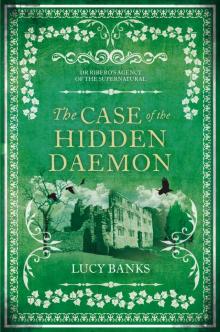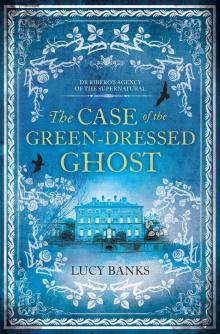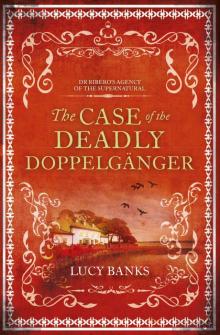- Home
- Lucy Banks
The Case of the Green-Dressed Ghost Page 9
The Case of the Green-Dressed Ghost Read online
Page 9
4th December, 1891
I do not like our new house on Coleton Crescent. I do not like it at all. I hardly like to admit it to Algie, who is so taken with it. I feel that my lack of enthusiasm will somehow dampen his, and I do not want to put an end to his pleasure. After all, as he keeps reminding me, it is a sign that we have “reached high,” that we can afford a property on the crescent, overlooking the river, in the most prominent place in the city.
Even when we viewed it for the first time, I felt uncomfortable here. There is an unnatural stillness to the property, a watchfulness, perhaps; I detected it even then. I attempted to address the issue with Algie, but he waved aside my protestations, insisting they were simply “womanish hysteria.” He told me he could sense nothing of the sort, and that the house had a most welcoming demeanour. I cannot imagine how he could feel such a thing. The house is nothing if not sombre and forbidding, at best.
Now that we have moved in, the uncomfortable sensation has become more pronounced. It has only been two days, and already I feel I am an unwanted guest here, that the house itself wishes to expel me from the premises, to forcibly throw me out of the door, never to return.
Margery has been a staunch support, as always. She tells me that it is normal for a new house to feel strange, and that I shouldn’t “feel amiss.” I am so glad we kept her. Algie wanted a new maid, but Margery has been with the family for such a long time, I should be desperately sad to see her go. She is right, I suppose. All houses must feel a little odd to begin with. After all, one becomes accustomed to familiar surroundings, and when placed somewhere new, it’s only natural to become a little unsettled.
Perhaps Algie is right, perhaps we should throw a party to celebrate our arrival. Some entertainment may lighten the mood and bring some life into this old house. Certainly it needs it. No matter how many windows I throw open, it always seems so dark.
16th December, 1891
I met with Mary today for afternoon tea at Molls. It was so very pleasant to see her, and so kind of her to travel this distance to see me. She told me all the news of Totnes, and I will confess, it made me miss it dearly. Ah, Totnes with its simpler, smaller-scale pleasures! I am still not convinced that city life agrees with me, though I understand of course that Algie needs to be here for his work.
Mary told me that Constance is to be married this coming spring. I was most pleased for her, although it pained me that I could only hear the news second-hand. After all, were we not all thick as thieves when we were younger? It made me feel so distanced from it all, as though I no longer existed in that world.
Her husband-to-be is a well-to-do farmer. It means she will stay near Totnes, close to her family. I confess, I do envy her a little. Although my family are not a long distance away, it is too far for my liking. I wish Mama lived closer. I do not like the thought of her living alone, even if Millicent regularly visits to check on her.
After our tea, I took Mary back to the house. She was eager to see it, especially after what I had told her. She admitted that it seemed “too quiet” as we sat in the parlour, and that it had a still quality to it, as though it was waiting for something to happen. I believe that was an apt way of describing it. Trust Mary to capture the mood so perfectly; she has always been so gifted with words.
However, she said that our furniture looked “capital” and that we had selected it well. Algie had allowed me to choose from the latest fabrics, and I had selected a William Morris wallpaper for the living room. It looks beautiful, like a garden brought indoors. Our dining table is especially magnificent and is made of polished cherry wood. Mary declared it the handsomest thing she had ever seen, and I am inclined to agree with her. The candelabra looks almost lost in the midst of it, like a tree stranded in a polished field!
It made me most happy to see Mary again and show her around our new home, though after she had left, I will admit, I felt all the lonelier without her. Margery was at market and the new cook is a dour old thing, I do not feel I can simply enter the kitchen for a conversation. She has the typically broad accent of someone from the north, and indeed, I struggle to understand her meaning behind all those spherical vowels and rumbling consonants.
The sun is setting now. Algie will be home soon. Or at least, I do hope that he will be home soon. It is most dismal to be alone in this house, with only the views of the River Exe to keep me company. The ticking of the mantelpiece clock is almost insufferable when I am alone, and the house most dreadfully cold in spite of the fire.
26th December, 1891
How I wish I had never ventured into the attic. He has brought it down. Algie, I mean. He has brought that horrible painting down, into the living room, and now I shall never be away from it. It is monstrous. He cannot see it, but I can. My Christmas has been ruined.
3rd January, 1892
Goodness, my last entry was short, and rather muddled. I do confess, Margery had provided me with some laudanum for my nerves, which have become worse of late. I feel I should explain my sentiments regarding the painting, or otherwise, dear reader, you shall remain quite perplexed forever.
A few days before Christmas, I was alone in the house. I often am, you see. It is not as it was in Totnes. Here, I am not surrounded by friendly faces, family, and acquaintances. Here, I am isolated, horribly so. Left alone in this dreadful house, which I am sad to say, I loathe more than ever.
I was alone, and sewing in the parlour, when I detected a noise above my head. I could not tell you what the noise was. Only that it was low, thrumming, and full of menace. It was as though a cacophony of whispers were filling my head: a terrible chorus of murmured threats and incantations. I know this must sound strange. Indeed, as I write it down I realise that anyone reading this may wonder if I am not a little mad. However, all I can say is that I do not feel mad. I feel quite sane. Sometimes I wonder if madness would be easier.
I sat in fright in the parlour, my sewing forgotten. The noise did not cease. It increased in volume until it seemed to shake the very walls of the house itself. Then, came the knocking. A loud, authoritative knock pounding through the floorboards. I discerned then that the noise was coming from the attic. I called out, but no one answered. Then I remembered it was Mrs Trevalley’s afternoon off, and Margery was purchasing cloth from the fabric shop. Fraser may have been pottering around in the garden, but if so, he was too far away to hear my cries.
The knock came again, and I knew I must answer it. I felt compelled to do so, as though drawn to the sound on a piece of string. Every fibre of my body was pulling me towards the source of the noise, though I desperately did not want to investigate. Against my will, I reluctantly climbed the stairs, then the narrow stairs leading to the attic door.
As I turned the handle, the noise stopped as abruptly as it had started. Silence surrounded me. And I felt the unbearable sensation of being watched. Eyes were burning into me; I could swear it. Fierce, malevolent eyes full of hatred and rage, all of it directed at my person.
I stepped into the attic, all the time suspecting that something dreadful would leap out upon me, seize me, and torment me. However, the attic was empty. Only packing cases, some pieces of furniture left by the previous owner, and in the corner, what looked to be a large painting, covered by a dusty cloth.
I do not know what compelled me to do it. And how I wish that I never had! Some dread spirit possessed me that day, something I had no control of. I marched towards the painting and tugged the cloth off in a cloud of thick dust.
And there it was. There she was. A portrait of a lady, dressed entirely in green. She would have been beautiful, I believe. Were it not for those eyes.
Oh, those eyes. I have not slept properly since I first saw them. Full of such venom, such malignant power. All of it fixed resolutely upon my trembling person. I believe I may have fainted. Certainly I found myself somehow on the floor, cowering, covering my own eyes to avoid meeting her gaze.
“That’s bloody horrible!” Kester exclaimed, quite forgetting himself. Beside him, Pamela looked up from her own book, peering over her reading glasses.
“Quite a read, isn’t it!” she said cheerfully, pointing at the diary.
Kester closed the book with a resolute thud and leant back in the deckchair. Although Pamela’s courtyard garden was small, it was a pleasant place to rest, especially on a sunny afternoon. The sunlight filtered through the branches of the apple tree, and bees were making themselves busy among the wildflowers. It felt quite at odds with the horrible book he was reading. What a dreadful tale, he thought anxiously. And all presumably true, given that it’s a diary. Unless of course, she was mad. Poor Emmeline, whoever she may have been.
“What happens next?” he asked, basking in the sunlight. Hemingway, Pamela’s shaggy sheepdog, snuffled over to sit beside them, and Kester gave him an absentminded pat, trying not to mind as the dog deposited several hairs all over his trousers.
“What, you mean in Emmeline’s diary?” Pamela asked.
“Yes.”
“Well, all sorts of terrible things happen with the painting, as you’ve probably already guessed.”
“What happened in the end? Did she manage to destroy it?”
Pamela nodded. “Yes, but that’s the problem.”
“What do you mean?”
“Well, Emmeline destroyed it, but some idiot decided to send it to be restored, a few months ago. As you can imagine, it’s caused a bit of a stir.”
Kester pondered for a moment. “I see. It’s a bit odd, isn’t it? A possessed painting?”
Pamela put down her book and reached for her iced tea. “No, not at all actually,” she said. “It’s relatively common for spirits to attach themselves to inanimate objects.” She sipped noisily. “Makes it that much harder to get rid of them though, especially if they’ve woven themselves into the fabric of the item.”
“But I’ve never heard of a ghost possessing an object before. A person, yes, but not an object.”
Pamela chuckled. “I think you’d be surprised. Djinn are very fond of living in inanimate objects.”
“What? Sorry, I didn’t catch that.”
“Djinn. Genies. You’ve heard of Aladdin’s lamp, I presume? That type of thing. We don’t get many djinn in Europe though. They can’t stand the cold.”
Kester sighed. He wasn’t sure he’d ever adjust to this talk of ghosts; the supernatural being discussed as frankly as though chatting about the weather. In spite of having seen two spirits in as many days, he still found the whole concept challenging to swallow. Beside him, Hemingway started to lick at his iced tea, which rather put him off drinking it again.
“What about poltergeists?” he said suddenly. “Do they like to live in objects?”
Pamela shook her head. “No, they just like to smash them around a lot. They’re incredibly annoying, to be honest. We’ve had some poltergeist cases that have been real hard work. We had one that was in a stationery cupboard recently.”
“I beg your pardon?”
“In an office, in Bristol. It wasn’t particularly harmful, it just liked throwing the pencils around. It was a nuisance to get rid of though, particularly as I kept getting paperclips thrown at my hair. I was picking them out for hours afterwards.”
Kester considered the notion of a haunted painting. It wasn’t a concept he liked the thought of at all, and the diary’s description of a malevolent portrait, complete with demonic eyes, made him feel distinctly uncomfortable.
“Where’s the painting now?” he asked, swatting at a hoverfly, which was threatening to land on his nose. “Is it in the same house?”
“Remarkably, yes it is,” Pamela replied, finishing off her drink. “The woman must have destroyed it then stuffed it in the attic again, only to be discovered a hundred or so years later. Although you’d be amazed how often that happens.”
“It’s rather creepy,” Kester said. “I’m not sure I like the idea of a ghostly painting. Especially one with evil eyes.”
Pamela giggled. “I’m sure this painting’s most malicious glare is nothing compared to our Serena. Maybe they should have a staring match. My money’s on Serena, every time.”
“Should I carry on reading?” he said, looking at the diary reluctantly. It was such a beautiful day, that he didn’t relish the thought of burrowing his head in a book, when he could fall asleep in the sun instead.
Pamela nodded. “Yep, Julio said you should try to get through as much as possible. Tell you what, I’ll leave you in peace while I go and make dinner.”
Kester smiled as she stood. It was incredibly kind of the older woman to let him stay at her house, even though it was rather filled with dog hairs, as Serena had correctly claimed. Hemingway followed his owner with a cheerful bark, wagging his tail so hard that a few neighbouring flowers lost their petals.
“Well, here goes,” he muttered, picking up the diary again. The very next entry he read made him wish that he hadn’t.
20th April, 1892
I have lost the baby. I know it for a fact. I saw what issued from me; there can be no doubt. Such pain I’ve never experienced before. Margery kept me as comfortable as possible until the doctor was able to come, but by then it was too late. I feel empty, hollow, as though the last essence of life within me has been extinguished. It is agony. Algie has taken it badly too. He paled when he saw the bloodied bedsheets, and couldn’t move from the spot, not even when Margery told him it “wasn’t a man’s business.”
I tried to tell him that it was the fault of the painting. But Algie would not listen. I have begged him several times to listen to me, but now, I am convinced that the portrait holds some power over him, a dreadful spell that he finds impossible to resist. Indeed, many times now I have seen him, standing motionless in front of it in the living room, staring open-mouthed at the lady in green, as though admiring a lover from afar. He is transfixed, and once, I even heard him murmur the word “beautiful” as he gazed at her.
Oh, but she is monstrous! I cannot understand why Algie loves her so! I have become too terrified to enter that room now. The simple act of walking past the door is a trial. Even if the door is closed, I can still feel those eyes, burning into me, hurting me from the inside. It is a wicked, dreadful thing. Whomever the lady may once have been, she was a terrible person, of this I am certain.
Even Margery agrees with me. She told me that the Green Lady has started to haunt her dreams; she now sleeps with the candle burning. She said that she had nightmares of the lady reaching out of the very canvas itself, grasping out with skeletal hands, trying to pull her in. She says she can no longer look at mirrors, for she sees the Green Lady staring back at her, instead of her own reflection.
I know exactly what she means, I have had similar visions myself. The Green Lady wishes to remove us from our world and trap us in hers. She is evil.
Why cannot Algie see it?
10th May, 1892
The doctor came today. I was subjected to the most intrusive of examinations. He refused to speak to me throughout, even though I questioned him greatly. I confess, I took an instant dislike to him, with his thick spectacles and prying hands. He looked rather as though he enjoyed his task a little too much, if I may say so.
Afterwards, I overheard him discussing me with Algie in the study. I heard the word “hysteria,” on more than one occasion. I know exactly what they think of me. Algie even called me mad to my face last night. He told me that I “must desist with this nonsense” then informed me darkly that “there would be consequences” if I remained unable to control myself.
I know that I must try harder to be the wife he expects me to be. But it is so very difficult when that painting has taken over everything. Algie is ver
y much changed since that terrible day it was brought down from the attic. I remember with great sadness the small acts of kindness he used to deliver to me—the gentle words, the little gifts. Ever since the painting was brought down, he has been a different person. Colder. Harder. And so horribly unkind. He even struck me once. It was not hard, but nonetheless, I wept. I wept more for what we had become, rather than from pain of the blow. I believed that we had a most happy marriage. Now I fear that this is no longer the case.
1st June, 1892
My own bad dreams have started. I see the Lady. Always I see the Lady. And always it is the same. I am transfixed, held to the painting by unseen hands, unable to move, nor even to turn my head away by the merest fraction. And she moves, fixing her eyes upon me. Those eyes! Even the thought of them turns my skin to ice. They pierce, they wound, they rip my very heart in two! They are the evillest things that I have ever seen.
In the dream, she is not content to merely glare. She reaches out of the canvas, as though stepping through a doorway. She leans towards me, full of malicious intent. And she seizes me. Those cold, skeleton fingers pierce through my skin, and my blood drips upon the floorboards.
It is then that I usually wake up, drenched in sweat, often screaming. I dare not sleep, but I am so weary. Why will Algie not destroy that painting? Why will he not listen to his wife and take a knife to it, tearing it into pieces? Does he not love me anymore? I begin to suspect that he loves her instead, the Green Lady. He has fallen under her evil spell; he is not the Algie I married.
Margery said we should return to Totnes. The thought is very tempting. Return home, escape this horrible, silent house, with its torture and its cruelty. It is a house under a curse; I believe that most strongly. It is haunted. I have smashed the mirror in my room. At least that will stop her watching me while I am asleep.
4th June, 1892
He has locked me in my bedroom! I can scarce believe that he would subject me to such indignity! He told me that “it was for my own good” and that I would have to remain here until the doctor could come.

 The Case of the Hidden Daemon
The Case of the Hidden Daemon The Hanged Man and the Fortune Teller
The Hanged Man and the Fortune Teller The Case of the Green-Dressed Ghost
The Case of the Green-Dressed Ghost The Case of the Deadly Doppelgänger
The Case of the Deadly Doppelgänger